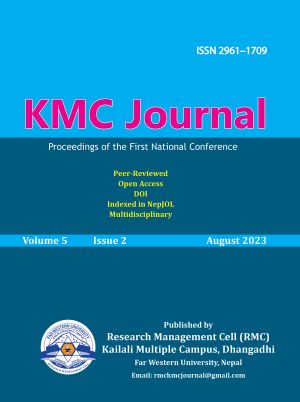Impact of Talent Management on Organizational Performance in Nepalese Non-government Organizations
DOI:
https://doi.org/10.3126/kmcj.v5i2.58237Keywords:
Human resources management, NGO, structural equation model, attraction, selectionAbstract
This study opted for a positivist perspective-based deductive approach to determine the impact of talent management on organizational performance in Nepalese non-government organizations. The causal_comparative research design was used to determine the intensity and magnitude of the relationship between the selected constructs of the inquiry. To collect the primary data, an email survey was administered using referral sampling that generated a ‘sufficient’ sample size of 404 with complete responses by respondents of various demographic backgrounds. For the data analyses, descriptive and inferential analyses were used. The key findings of the study using the structural equation model revealed that attraction, selection, and retention were the drivers of improving organizational performance in the chosen context. However, talent development had no significant influence on organizational performance.
Downloads
Downloads
Published
How to Cite
Issue
Section
License

This work is licensed under a Creative Commons Attribution-NonCommercial 4.0 International License.
This license allows reusers to distribute, remix, adapt, and build upon the material in any medium or format for noncommercial purposes only, and only so long as attribution is given to the creator.




